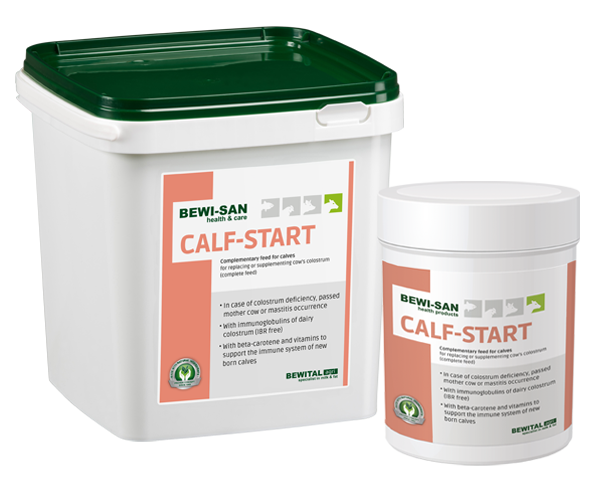Colostrum supply – “Four golden rules”
Calves do not receive any immunoglobulins in the womb from the cow’s uterus. This means that immediately after birth, they are completely dependent on colostrum to build up an early immunity. A needs-based colostrum supply by the farmer is therefore important to promote calf health and avoid losses in the postnatal phase.
There are some basic aspects to consider – the four golden rules for colostrum supply provide practical guidance.
The sooner, the better!
The importance of early colostrum administration was impressively demonstrated in the study by Fischer et al. (2018): Prompt supply directly after birth led to a rapid increase in the IgG concentration in the blood – and thus to rapid immunisation of the calf.
If, on the other hand, primary care is delayed – for example to 6 or even 12 hours after birth – the IgG level rises only slowly. As a result, the critical phase without sufficient defences is prolonged – and the calf is significantly more susceptible to disease.

Influence of the timing of colostrum supply on the IgG concentration in the blood serum of calves (Fischer et al. 2018)
Hygiene from milking to teat – an underestimated risk factor
In practice, colostrum is usually milked directly into a jug. However, studies show that the valuable colostrum can already be heavily contaminated with pathogens in the jug.
This bacterial load can even increase until feeding:
According to Boelhauve et al. (2018), almost 70 % of colostrum samples were contaminated with coliform bacteria up to the teat.

Source: Boelhauve et al., 2018
The intestinal wall is often already colonised with germs before colostrum reaches the intestine. Possible causes:
- The intestinal barrier is already partially blocked
- “Inoculation” with foreign germs already takes place in the calving box
- Colostrum is heavily contaminated with germs:
- Is the same jug used for fresh milkers and udder sick animals?
- Are the jug, bucket and teat cleaned after each milking or watering?
The four golden rules of colostrum feeding
An inadequate supply of immunoglobulins in the first few hours of life has serious consequences: Immunodeficiency, high losses, poor weight gain and rising treatment costs are inevitable.
Failures in this early phase cannot be compensated for later.
In addition, if colostrum is contaminated with pathogens, calves are more likely to contract lung and diarrhoea infections. An optimal supply of flawless colostrum has an effect on the health stability and survival rate of the calves and continues to have an effect on the calves into later lactation.
Here are the four golden rules for colostrum feeding:

- Rule 1 – Speed: Administer the first colostrum as soon as possible after birth – ideally within the first two hours. This is because the calf’s ability to absorb antibodies is particularly high during this period.
- Rule 2 – Quantity: A newborn calf should receive around 3 to 4 litres of colostrum in the first 12 hours of life. This is the only way to ensure an optimum supply of nutrients and immunoglobulins.
- Rule 3 – Quality: The quality of the colostrum is crucial. Make sure that it contains at least 50 g/l immunoglobulin G (IgG). This can be determined using a colostrometer or Brix refractometer.
- Rule 4 – Cleanliness: Only colostrum obtained and stored under clean conditions protects the calf effectively. Store it at a low temperature and heat it gently before feeding so as not to damage the valuable ingredients.
Targeted upgrading of colostrum – for an optimal start
In addition to the “four golden rules”, it can be useful to specifically enhance the colostrum:
BEWI-SAN Calf Start – a supplementary feed made from high-quality colostrum powder, vitamins and probiotics – provides optimum support for the calf’s health and immune defences.
Find out how versatile BEWI-SAN Calf Start can be used in practice.
Gut health in calves
It is known that immunoglobulins are just one of the many valuable components of colostrum. Oligosaccharides, leukocytes and growth factors also play a decisive role: they promote the maturation of the intestine, support the development of healthy intestinal flora and strengthen the body’s defences from the very beginning.
